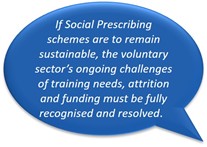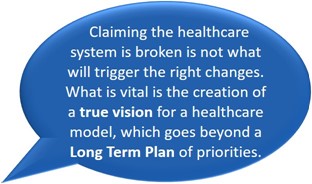Social Prescribing: the silver bullet?
Author: Aahuti Rai
Numerous studies acknowledge the rise of chronic conditions linked to lifestyle choices, socio-economic circumstances, and environmental factors. With the reality of the changing health needs of the UK population, the challenge is two-fold. The vulnerabilities of the NHS in its current form need to be rectified, ensuring progress on waiting times, outcomes and addressing the workforce shortages. This must be authentically followed through with a vision for prevention, which is acknowledged as requiring holistic and early intervention health strategies.
 We need to create health-promoting environments by:
We need to create health-promoting environments by:
- increasing health literacy
- enforcing statutory regulations e.g. advertising and taxation of products/services that are damaging to health
- generating industry commitment for a ‘health code of conduct’
- addressing the accessibility gap due to inequalities.
However, this requires radical change at two levels: firstly, in how each of us understand ‘good health’ and the lifestyle factors that personally impact us; secondly, in how we change the ‘symptom’ focus of our current health system, going beyond the funding and medical boundaries of the NHS as it stands today.
The allotted funding for link workers in the NHS Long Term Plan, as well as the appearance of Social Prescribing as one of the 10 high impact actions for General Practice (in an attempt to reduce their workload), is a positive commitment to move the nation toward disease prevention, and management of disease with lifestyle changes.
The history
Social Prescribing schemes aim to encourage people to take greater control of their health, and the activities are intended to augment treatment plans in order to generate positive health and wellbeing outcomes. This is not a new concept. The effectiveness of Social Prescribing was proven long ago, even before the birth of the NHS, with pioneering investigations such at The Peckham Experiment (1926-1950), which saw conclusive evidence for health creation in community settings, particularly when people and families are given information, and then freedom to choose their activities. Since then, other trailblazing GPs have pursued their belief in a prevention strategy: this has given rise to successful and expansive schemes as witnessed in Tower Hamlets, Culm Valley and Crawley. The cascading, positive effects of such pioneering schemes have actively made the case for what we now see as a national mandate and movement for Social Prescribing.
Two questions for the future
My view of Social Prescribing, based on more than twenty years of personal experience among friends and family, is immensely positive. Two questions remain, however: firstly how can it become a scalable solution that is also sustainable; and secondly, whether the current NHS approach to Social Prescribing is far-reaching enough. My independent observations lead me to conclude that more work is needed to realise the full potential for the longer term.
 Dependence on a range of stakeholders outside the NHS
Dependence on a range of stakeholders outside the NHS
National level
The strategic mandate - the NHS Long Term Plan, is a plan for NHS England. The plan, and what has been committed to in the way of funds for link workers, personal health budgets and shared responsibility, requires other important parties to come to the table with aligned strategies and funds. More detailed interdependent plans and papers, due later in 2019, will evidence whether this is actually likely to happen.
Local level
Collaboration is necessary but challenges are further intensified at a local level where patients, local authorities, families and communities, case management companies, voluntary organisations and local businesses need to be brought to the table as equal partners, in order to translate the plan into delivery. Over the years we haven’t seen a consistent track record of this type of cross-sector collaboration; this is a significant impediment to overcome, in order for Social Prescribing to be effective.
The problems of working with the voluntary sector
A pre-determined component of the Social Prescribing model is leveraging all community-based assets (places, people and services) to meet local population needs. This includes partnerships with charitable organisations and volunteer-led initiatives, and establishing champion roles within the local community to serve as a community-based extension of the link worker role. Increasingly, the voluntary sector, itself reliant on the goodwill of volunteers, is being relied upon to plug gaps.
The Link Worker – a strong idea, but fragile in its reliance on support systems
An integral role for all Social Prescribing schemes, and one that has had funding commitment from NHS England is the 'link worker' (or ‘navigator’) role. NHS England has agreed to fund 1000 link workers supporting 1,400 Primary Care Networks. They will be recruited and trained to deal with patient cases that are not medical in nature. It is intended that by 2023-24, link workers will be handling 900,000 patients. The link worker role needs to be the strongest link in the chain; if this role fails, the whole scheme is impacted. However, in its design, it is the most vulnerable link in the chain: it is driven by an expansive set of responsibilities and delivery outcomes that can only be achieved if all the other support elements are in place.
Re-mapping of roles
To achieve optimum patient health, traditional roles need to be reconsidered which presents both a challenge and an opportunity. The lines seem to be blurred between the role of a link worker and other various inter-linked roles such as social worker, health coach, occupational therapist and admiral nurses. We have the opportunity to re-map each of these roles to ensure the patient health pathway is seamless and works to one personalised treatment plan, for social and clinical needs, and with informed patient choice and consent. This would support Principle 4 of the NHS Constitution which states: "...NHS services must reflect, and should be coordinated around and tailored to, the needs and preferences of patients, their families and their carers...".
I believe this would strengthen the unity amongst these similar non-clinical, patient-facing roles, allowing them to manage the increase in referrals that will inevitably translate into a longer-term workload, considering the high-touch requirement in supporting lifestyle change.
Is Social Prescribing far-reaching enough?
More use needs to be made of science, to inform personal choices There is very little in the Long Term Plan that promotes the use of more advanced and updated science to solve the major mechanisms underlying chronic metabolic diseases. The clinical priorities largely focus on early detection and disease management and even then, the change agenda continues to be organised around single diseases despite the growing number of people living with multiple conditions. If we are to make a success of Social Prescribing, we need to focus on understanding and solving the root cause of chronic diseases. Substantially more education and guidance will be required, informed as necessary by a range of markers and diagnostic techniques, so that health, dietary and lifestyle choices are truly aligned to personalised health regeneration plans.
There is very little in the Long Term Plan that promotes the use of more advanced and updated science to solve the major mechanisms underlying chronic metabolic diseases. The clinical priorities largely focus on early detection and disease management and even then, the change agenda continues to be organised around single diseases despite the growing number of people living with multiple conditions. If we are to make a success of Social Prescribing, we need to focus on understanding and solving the root cause of chronic diseases. Substantially more education and guidance will be required, informed as necessary by a range of markers and diagnostic techniques, so that health, dietary and lifestyle choices are truly aligned to personalised health regeneration plans.
Who will be the gatekeeper for ‘Information Prescribing’?
As society claims back health ownership, there is a danger of placing more reliance on the internet as a source of information. Health-related concerns dominate much of what people search for, and what is typically found is a confusing array of medical information ranging from evidence-based research to dubious advertisements for miracle cures. What, then, does this mean regarding our expectations for information integrity? The NHS abides by its Information Standard to provide what it defines as reliable information via its various portals such as Health AtoZ and NHS Inform. However, answers to common health questions, backed with good science, also lie outside of the medical domain of the NHS and hence the need to strike the ‘right’ balance between information transparency for all viable health solutions (including non-medical, non-pharma solutions), with a level of governance around the quality of that information. Whilst we cannot reasonably expect the NHS to assume responsibility for all health information in cyberspace, given the numerous science-backed solutions that go beyond the NHS domain, this does leave a gap in accountability which must be assumed by an independent and objective third party who can take a public stance on ‘Information Prescribing’, promoting credible sources of good science for health solutions.
The need for exceptional leadership Whilst NHS leaders have done what was asked of them in producing a forward-looking plan to set out how the increase in funding will be utilised; the plan is variable in its level of detail; it suggests a more evolutionary set of changes, albeit with continuity from the Five Year Forward View. The plan will require exceptional leadership, particularly for transformative elements, to see the change agenda through to delivery. This is a disquieting assumption at a time where there are widespread leadership vacancies.
Whilst NHS leaders have done what was asked of them in producing a forward-looking plan to set out how the increase in funding will be utilised; the plan is variable in its level of detail; it suggests a more evolutionary set of changes, albeit with continuity from the Five Year Forward View. The plan will require exceptional leadership, particularly for transformative elements, to see the change agenda through to delivery. This is a disquieting assumption at a time where there are widespread leadership vacancies.
The advocacy of Social Prescribing and wider Population Health thinking is very welcome but it introduces, and highlights, a whole new set of vulnerabilities. It is likely that these will only be seen and felt as we progress down the line with implementation.
There is no shortage of magnificent scientists, researchers, medics, health professionals (clinical and non-clinical), and economists imparting their science and their wisdom. There are numerous reports, some based on observation and dating back to early 2000’s, for example the Wanless report, and some based on compelling science and as recent as 2018, for example, the Alliance for Natural Health Blueprint for Health System Sustainability. However, the ‘powers that be’ must be courageous in uprooting the many indoctrinated belief systems and legacy decisions. This will create space to incorporate the many wise and evidence-backed insights and solutions that can form a new healthcare vision; one which embodies historic traditions, together with established modern research to create a genuine human-centered model that our future generation deserves.
Prescription for Social Prescribing
We need a vision and a strategic plan for a healthcare system that can:
- transition from coping with the acute needs, and embedded chronic diseases that are the reality of today
- run in parallel to a new system that starts upstream before the manifestation of disease has even begun
- solves the root causes of chronic conditions.
I have full confidence in Social Prescribing as a solution to drive wellbeing outcomes. I have less confidence for the sustainability of it in its current focus, which is largely social rather than holistic health creation for all generations; and also because of the dependency, it has on an already overburdened voluntary sector.
This article represents my personal views and observations.
Aahuti Rai
About the author:
My portfolio of roles bring together my personal and professional interests and allow me to live intentionally aligned to my purpose, doing what I enjoy:
- Four Points Consulting Ltd: A niche consulting business established in 2001, of which I am Co-founder. We work with large organisations supporting, enabling, and helping them to unlock the potential of change with services centred around: Accelerating Change - Performance Turnaround - Strategy Development
- I am a member of the Alliance for Natural Health (International) Transformation Board, established with a specific aim to drive change for the betterment of population health using bottom-up strategies and through designing and trialing new healthcare delivery models
- Wellness Entrepreneur: I focus on investment and advisory roles for health and wellness startups that have an authentic mission to support health creation for the masses.
Contact details:
Email: aahuti@fourpoints.net
Twitter:
Company:@aahutirhealth,
Personal: @aahutirai
LinkedIn: https://www.linkedin.com/in/meetaahuti/